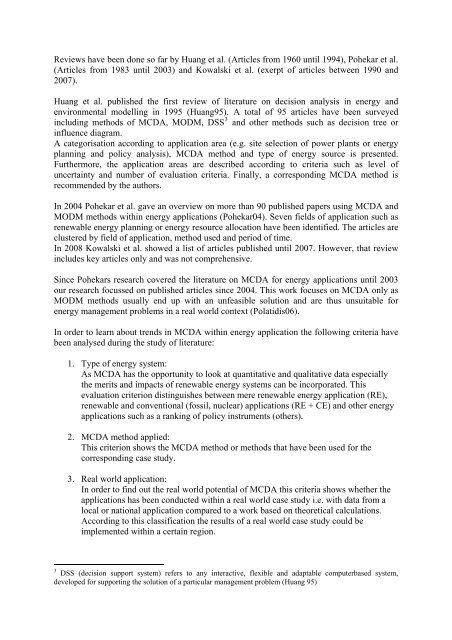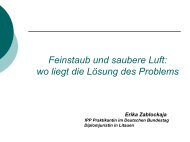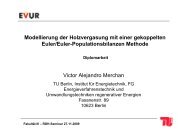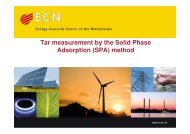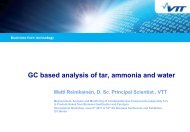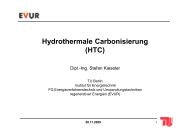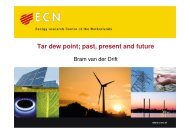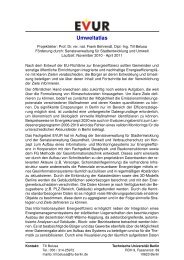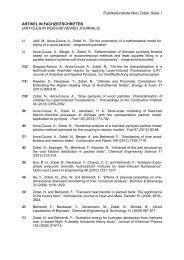Insert the title here - EVUR - TU Berlin
Insert the title here - EVUR - TU Berlin
Insert the title here - EVUR - TU Berlin
Create successful ePaper yourself
Turn your PDF publications into a flip-book with our unique Google optimized e-Paper software.
Reviews have been done so far by Huang et al. (Articles from 1960 until 1994), Pohekar et al.<br />
(Articles from 1983 until 2003) and Kowalski et al. (exerpt of articles between 1990 and<br />
2007).<br />
Huang et al. published <strong>the</strong> first review of literature on decision analysis in energy and<br />
environmental modelling in 1995 (Huang95). A total of 95 articles have been surveyed<br />
including methods of MCDA, MODM, DSS 3 and o<strong>the</strong>r methods such as decision tree or<br />
influence diagram.<br />
A categorisation according to application area (e.g. site selection of power plants or energy<br />
planning and policy analysis), MCDA method and type of energy source is presented.<br />
Fur<strong>the</strong>rmore, <strong>the</strong> application areas are described according to criteria such as level of<br />
uncertainty and number of evaluation criteria. Finally, a corresponding MCDA method is<br />
recommended by <strong>the</strong> authors.<br />
In 2004 Pohekar et al. gave an overview on more than 90 published papers using MCDA and<br />
MODM methods within energy applications (Pohekar04). Seven fields of application such as<br />
renewable energy planning or energy resource allocation have been identified. The articles are<br />
clustered by field of application, method used and period of time.<br />
In 2008 Kowalski et al. showed a list of articles published until 2007. However, that review<br />
includes key articles only and was not comprehensive.<br />
Since Pohekars research covered <strong>the</strong> literature on MCDA for energy applications until 2003<br />
our research focussed on published articles since 2004. This work focuses on MCDA only as<br />
MODM methods usually end up with an unfeasible solution and are thus unsuitable for<br />
energy management problems in a real world context (Polatidis06).<br />
In order to learn about trends in MCDA within energy application <strong>the</strong> following criteria have<br />
been analysed during <strong>the</strong> study of literature:<br />
1. Type of energy system:<br />
As MCDA has <strong>the</strong> opportunity to look at quantitative and qualitative data especially<br />
<strong>the</strong> merits and impacts of renewable energy systems can be incorporated. This<br />
evaluation criterion distinguishes between mere renewable energy application (RE),<br />
renewable and conventional (fossil, nuclear) applications (RE + CE) and o<strong>the</strong>r energy<br />
applications such as a ranking of policy instruments (o<strong>the</strong>rs).<br />
2. MCDA method applied:<br />
This criterion shows <strong>the</strong> MCDA method or methods that have been used for <strong>the</strong><br />
corresponding case study.<br />
3. Real world application:<br />
In order to find out <strong>the</strong> real world potential of MCDA this criteria shows whe<strong>the</strong>r <strong>the</strong><br />
applications has been conducted within a real world case study i.e. with data from a<br />
local or national application compared to a work based on <strong>the</strong>oretical calculations.<br />
According to this classification <strong>the</strong> results of a real world case study could be<br />
implemented within a certain region.<br />
3 DSS (decision support system) refers to any interactive, flexible and adaptable computerbased system,<br />
developed for supporting <strong>the</strong> solution of a particular management problem (Huang 95)


